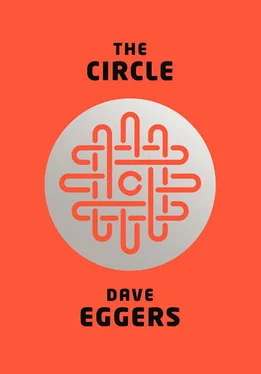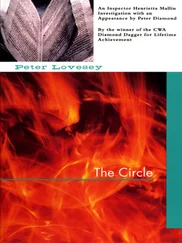“First day,” he said. “Well congratulations. A toast.”
They clinked bottles and took sips. Mae held her bottle up to the moon to see how much was left; the liquid turned an otherworldly blue and she saw that she’d already swallowed half. She put the bottle down.
“I like your voice,” he said. “Was it always that way?”
“Low and scratchy?”
“I would call it seasoned . I would call it soulful . You know Tatum O’Neal?”
“My parents made me watch Paper Moon a hundred times. They wanted me to feel better.”
“I love that movie,” he said.
“They thought I’d grow up like Addie Pray, streetwise but adorable. They wanted a tomboy. They cut my hair like hers.”
“I like it.”
“You like bowl cuts.”
“No. Your voice. So far it’s the best thing about you.”
Mae said nothing. She felt like she’d been slapped.
“Shit,” he said. “Did that sound weird? I was trying to give you a compliment.”
There was a troubling pause; Mae had had a few terrible experiences with men who spoke too well, who leaped over any number of steps to land on inappropriate compliments. She turned to him, to confirm he was not what she thought he was—generous, harmless—but actually warped, troubled, asymmetrical. But when she looked at him, she saw the same smooth face, blue glasses, ancient eyes. His expression was pained.
He looked at his bottle, as if to lay the blame there. “I just wanted to make you feel better about your voice. But I guess I insulted the rest of you.”
Mae thought on that for a second, but her brain, addled with Riesling, was slow-moving, sticky. She gave up trying to parse his statement or his intentions. “I think you’re strange,” she said.
“I don’t have parents,” he said. “Does that buy me some forgiveness?” Then, realizing he was revealing too much, and too desperately, he said, “You’re not drinking.”
Mae decided to let him drop the subject of his childhood. “I’m already done,” she said. “I’ve gotten the full effect.”
“I’m really sorry. I sometimes get my words in the wrong order. I’m happiest when I don’t talk at something like this.”
“You are really strange,” Mae said again, and meant it. She was twenty-four, and he was unlike anyone she’d ever known. That was, she thought drunkenly, evidence of God, was it not? That she could encounter thousands of people in her life thus far, so many of them similar, so many of them forgettable, but then there is this person, new and bizarre and speaking bizarrely. Every day some scientist discovered a new species of frog or waterlily, and that, too, seemed to confirm some divine showman, some celestial inventor putting new toys before us, hidden but hidden poorly, just where we might happen upon them. And this Francis person, he was something entirely different, some new frog. Mae turned to look at him, thinking she might kiss him.
But he was busy. With one hand, he was emptying his shoe, sand pouring from it. With the other he seemed to be biting off most of his fingernail.
Her reverie ended, she thought of home and bed.
“How will everyone get back?” she asked.
Francis looked out at a scrum of people who seemed to be trying to form a pyramid. “There’s the dorms, of course. But I bet those are full already. There are always a few shuttles ready, too. They probably told you that.” He waved his bottle in the direction of the main entrance, where Mae could make out the rooftops of the minibuses she’d seen that morning on her way in. “The company does cost analyses on everything. And one staffer driving home too tired or, in this case, too drunk to drive—well, the cost of shuttles is a lot cheaper in the long run. Don’t tell me you didn’t come for the shuttle buses. The shuttle buses are awesome. Inside they’re like yachts. Lots of compartments and wood.”
“Lots of wood? Lots of wood?” Mae punched Francis in the arm, knowing she was flirting, knowing it was idiotic to flirt with a fellow Circler on her first night, that it was idiotic to drink this much on her first night. But she was doing all those things and was happy about it.
A figure was gliding toward them. Mae watched with dull curiosity, realizing first that the figure was female. And then that this figure was Annie.
“Is this man harassing you?” she asked.
Francis moved quickly away from Mae, and then hid his bottle behind his back. Annie laughed.
“Francis, what are you so squirrelly about?”
“Sorry. I thought you said something else.”
“Whoa. Guilty conscience! I saw Mae here punch you in the arm and I made a joke. But are you trying to confess something? What have you been planning, Francis Garbanzo?”
“Garaventa.”
“Yes. I know your name.”
“Francis,” Annie said, dropping herself clumsily between them, “I need to ask you something, as your esteemed colleague but also as your friend. Can I do that?”
“Sure.”
“Good. Can I have some alone time with Mae? I need to kiss her on the mouth.”
Francis laughed, then stopped, noticing that neither Mae nor Annie was laughing. Scared and confused, and visibly intimidated by Annie, he was soon walking down the steps, and across the lawn, dodging revelers. Halfway across the green he stopped, turned back and looked up, as if making sure Annie intended to replace him as Mae’s companion that night. His fears confirmed, he walked under the awning of the Dark Ages. He tried to open the door, but couldn’t. He pulled and pushed, but it would not budge. Knowing they were watching, he made his way around the corner and out of view.
“He’s in security, he says,” Mae said.
“That’s what he told you? Francis Garaventa?”
“I guess he shouldn’t have.”
“Well, it’s not like he’s in se cur ity-security. He’s not Mossad. But did I interrupt something you definitely shouldn’t be doing on your first night here you idiot?”
“You didn’t interrupt anything.”
“I think I did .”
“No. Not really.”
“I did. I know this.”
Annie located the bottle at Mae’s feet. “I thought we ran out of everything hours ago.”
“There was some wine in the waterfall—by the Industrial Revolution.”
“Oh, right. People hide things there.”
“I just heard myself say, ‘There was some wine in the waterfall by the Industrial Revolution.’”
Annie looked across the campus. “I know. Shit. I know.”
At home, after the shuttle, after a jello shot someone gave her onboard, after listening to the shuttle driver talk wistfully about his family, his twins, his wife, who had gout, Mae couldn’t sleep. She lay on her cheap futon, in her tiny room, in the railroad apartment she shared with two near-strangers, both of them flight attendants and rarely seen. Her apartment was on the second floor of a former motel and it was humble, uncleanable, smelling of the desperation and bad cooking of its former residents. It was a sad place, especially after a day at the Circle, where all was made with care and love and the gift of a good eye. In her wretched low bed, Mae slept for a few hours, woke up, recounted the day and the night, thought of Annie and Francis, and Denise and Josiah, and the fireman’s pole, and the Enola Gay , and the waterfall, and the tiki torches, all of these things the stuff of vacations and dreams and impossible to maintain, but then she knew—and this is what was keeping her up, her head careening with something like a toddler’s joy—that she would be going back to that place, the place where all these things happened. She was welcome there, employed there.
She got to work early. When she arrived, though, at eight, she realized she hadn’t been given a desk, at least not a real desk, and so she had nowhere to go. She waited an hour, under a sign that said LET’S DO THIS. LET’S DO ALL OF THIS, until Renata arrived and brought her to the second floor of the Renaissance, into a large room, the size of a basketball court, where there were about twenty desks, all different, all shaped from blond wood into desktops of organic shapes. They were separated by dividers of glass, and arranged in groups of five, like petals on a flower. None were occupied.
Читать дальше












